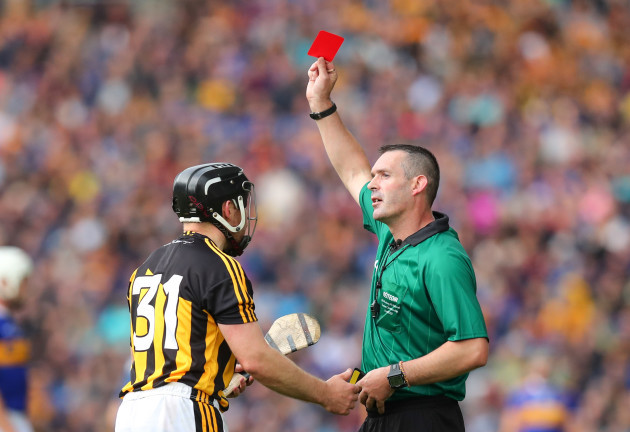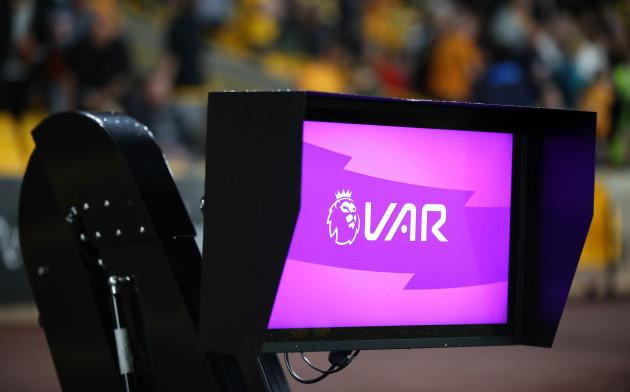ANOTHER WEEK IN which television coverage of sport articulated a fundamental difference between ourselves and Those Over The Water.
On RTÉ, a few Hurling Folk cavilled with a referee’s correct sending Richie Hogan off in the All-Ireland final.
“Could you take it in the spirit of the All-Ireland? I know maybe that it’s technically a red card, but Richie’s not a dirty hurler…”, said Jackie Tyrell on The Sunday Game.
Tyrrell shares with other pro-Hoganites Henry Shefflin and Michael Duginan the same vague truth: given how hard Hogan has worked to get to an All-Ireland final, it is unjust to deny him the fruits of his intense labours. Why should anyone miss a chunk of a big game for something as trifling as breaking a plainly-stated rule?
This generosity of spirit seems to govern the GAA disciplinary system, which is one of the most benevolent anywhere in the world.
To miss an All-Ireland final through suspension is now largely a result of carelessness or outrageous misfortune, as befell Jimmy Keaveney in 1979, when a Papal visit to the Phoenix Park caused the All-Ireland final to shuffle back a September week and fall within the final days of Keaveney’s eight-week ban.
Generally, though, mercy droppeth from the CCCC less gently than November rain.
There is an abiding suspicion of the very concept of rules running throughout the GAA, and sometimes not without merit: see the recurring Gaelic football truth that, were games to be officiated strictly according to the four-step rule, the game simply could not be played.
So whereas calls to exonerate Hogan during the All-Ireland final probably showed too high a disregard for the rules, English football is currently in a tangle because of its reverence for them.
Nobody spoke for this belief clearer this week than Ian Holloway, who clarified comments on Sky Sports which appeared to blame the EU for the new handball rule.
“I’m sick and fed up of being told what to do by people who aren’t running our country.
“Fifa and Uefa have brought these rules in, they told us we’ve got to use VAR that I’ve got no problem with, but that handball rule that they’ve made up, I don’t want to listen to them. That’s nonsensical.
It’s just in the same way that I’m sick and fed up of us in the UK being told what to do by the EU. What I’m saying is, as an English person, I’m sick and fed up of being told what we’ve got to do. Our country is fantastic.
“If you let us make our own rules up, do what we want to do, we’ll be in control of it a lot better.”
Theirs is a culture forever eager to establish their own facts and laws, and it was of course they who first codified football: a game that had existed in varying, informal guises across the world for centuries.
In recent years, swathes of their television coverage of the sport has reflected this as it has become increasingly obsessed with establishing absolute justice. Thus analysis of games has often veered toward an analysis of referees with grave mistakes and marginal, occasionally imperceptible errors exposed with slow motion and multiple angles.
The only point at which Match of the Day has let us down over the years is the edited package that rolls when Lineker says that ‘there were a number of controversial decisions to look at…”
Sky were at it again on Friday night, showing Everton manager Marco Silva a looped clip of a potential penalty-area foul by Jack Grealish on Richarlison during his post-match interview with Geoff Shreeves. Silva was unmoved when encouraged to say his side had been wronged.
Highlighting incidents in this way encouraged and normalised the idea that every decision should be right, and the natural endpoint is the arrival our complicated new friend, VAR.
Given that stadia across England have been shaking to chants of “Fuck VAR” over the last three weeks – it’s not going very well, is it?
Its interference in games robs the game of some of its chaos, and its checking each and every goal for offside infringements that are sometimes almost imperceptible to the human eye will soon dull the ecstasy of the goalscoring moment, which will be one of the most profound changes to the game in its history.
“The euphoric moments that supporters go to games for, and the euphoric moments that players are playing for, are being lost”, said Danny Murphy on Match of the Day 2.
The championing of VAR is also predicated on the theory that the rules being religiously followed is the point of the sport, which isn’t necessarily true.
Football exists in many countries across the world as one of the few gifts of imperialism, and it has thus become a transgressive theatre in which local craft and ingenuity could violate imposed strictures.
This is one of the reasons Diego Maradona’s handball against England is as celebrated in Argentina as his astonishing mazy dribble in the same game, and why the man himself said in the recent documentary of his life that football is a “game of deception.”
While arguing that Richie Hogan should have stayed on the field just because the game was important stretched things beyond reason, VAR’s troubles show that sometimes sports don’t suffer because of a healthy disrespect for their own rules.


